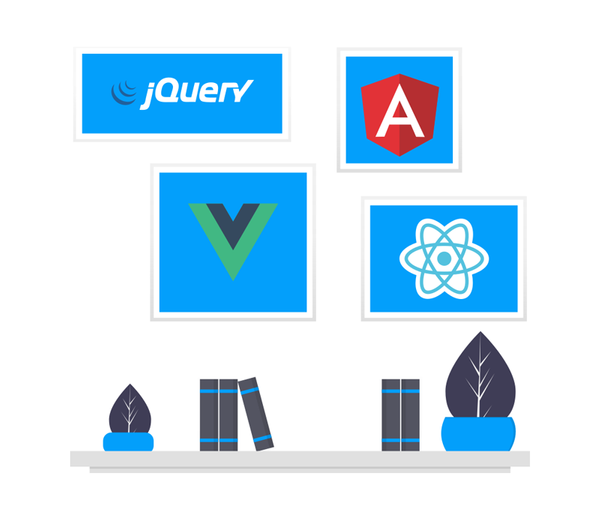Amongst the popular frameworks for frontend development, angular and vue are much debated in comparison. Vue vs angular – which one would be the best choice? Not an obvious answer, as each has its advantages and challenges.
As usual, for this kind of conversation, the answer is ”it depends.” On what, we’ll discover in the following lines.
If you want an overall look at web development frameworks, we’ve also selected our preferences in another article. Now, let us explore each of these Javascript frameworks before we get to list the angular vs vue differences.
1. What is Angular?
Simply put, Angular is a frontend Javascript framework built on TypeScript. Remember the 2010 Angular JS? In 2016 it was rewritten, resulting in the release of Angular. Its authors – Misko Hervey and Google’s Angular Team. Angular has built-in libraries and tools which allow the development of scalable web applications, as they don’t restrict the app speed or size.
The angular framework has components like Node JS, Express JS, or Mongo DB, which made it popular, along with its HTML templates and the MVC framework as features. A StackOverflow survey conducted in 2019 shows that 32,4 % of the professional developers preferred the angular framework, which counted as the framework of choice for 30,7% of all respondents (the data was compiled from over 63 000 responses).
The same survey shows a very tight angular vs react competition: angular is slightly more preferred by professional developers (only 0,1% more), while in the overall responses, react has a 0,6% advantage.
Interestingly enough, a more recent Statista survey released in August 2021 shows that the percentage of worldwide developers who prefer Angular is almost 23, almost 7% less than in 2019 (consider that the two surveys were conducted by different organizations, though the sample size is not that different: approx. 63 595 in 2019 vs approx. 67 593 in 2021). In 2021, React.js was on top with 40,14% of the preferences.
From its initial release, the AngularJS version, the js framework has reached its 13th version. Angular13 was released in November 2021, and it is the currently active version. As a practice, major releases follow a 6 months cycle, with 1 to 3 minor releases for each and weekly patch releases. Pre-release builds are also made available for early adopters (after the initial validation by Google, of course), so they can test and offer feedback.
Starting with Angular version 7 onward, web app developers who choose this platform must align the Angular core and the CLI versions.
2. What is Vue?
Vue is a flexible, lightweight, progressive frontend javascript framework. It is the go-to for user interfaces, as its focus is on the view layer. Also, it’s the preferred tool for developing modern SPAs. It allows for building progressive UI, as developers can change the app code without affecting the core features.
To create a Vue app, developers create a new Vue instance, which becomes the root Vue instance. The following components can be organized as a tree with nested, reusable elements, as many web apps are created. Components can be used endlessly.
Although it is adopted as a lightweight framework, Vue can also be used for a complex singlepage application.
Vue was created in 2014 by Evan You, a former Google employee, and it evolved thanks to the open-source development community. After having the angular framework experience, You put in Vue the best of Angular, avoided its setbacks, and added the best of React (by Facebook), the other very popular framework.
The current, stable version is vue3.2.31. Vue3.2 was released in August 2021. Compared to the Angular development team, the Vue team doesn’t have a predetermined release cycle. New features are added every 3 to 6 months. Still, major releases are pre-announced and have an alpha/beta testing period, with early discussions in the open-source developing community.
As for Vue vs angular preferences amongst developers worldwide, the Statista survey shows that Vue.js is right behind Angular.js at a 4% difference (18,97% vs 22,96%). If we look at the StackOverflow survey in 2019, the difference was significantly greater: around 15,2% of respondents preferred Vue – half of whom preferred Angular.
Could it mean that in the following two years, the advantages of vue convinced so many developers to adopt it? We’ll try to understand it further by exploring the angular vs vue differences.

3. What is the difference between Angular and Vue?
You may be tempted to think there are more similarities than differences, as vue js was built on the example and best practices of angular js. Let us see if this is the case.
Vue vs Angular Popularity
As we showed with the above examples of the two surveys, Angular tends to be more popular than Vue amongst web developers worldwide. Although the “competition” tightened over the past two years, Angular is still ahead of Vue in popularity, according to these surveys.
However, if we look at GitHub, Vue has over 190k stars, compared to the 80k stars Angular has currently gathered. Still, many large companies prefer Angular thanks to its ability to build a large, complex application with ease.
Vue vs Angular Learning Curve
There is no question about which one takes more time to learn: Angular is the “winner.” It is complex, it requires understanding additional concepts like Model View Controller (MVC) and TypeScript. On the other hand, Vue is simpler both from an API and design perspective. Those who know JavaScript and are familiar with HTML will find it easy to learn Vue.
Flexibility
Vue is known for its flexibility, which made it so popular. Its modular feature makes it highly adaptable to a wide range of projects. In the Vue ecosystem, Vue CLI is the tooling baselined used as a standard. As a result, developers don’t need to spend much time on configurations, only if they want some tweaks.
Still, those development teams who need more structure, especially to support efficient decision-making, will surely prefer Angular’s approach. The app architecture provided by Angular is more suited to build large, complex apps. Angular uses NgModules to organize its components; these modules can exchange functionalities with other NgModules. When organized by functions, it makes it easier to build complex apps.
Complexity
Vue is much simpler than Angular in how it looks and is used. If we compare vue vs angular syntax, the first is easier from afar. When using Angular, expect long lines of code, even for simple actions. Its complex structure rules, however, are well suited for large applications, as we showed before.
Vue vs Angular size
When comparing vue vs angular regarding which framework to use, size is one important aspect. By far, Vue is lighter than Angular. Even with the newer, sized-down versions of Angular, an application can reach ~65KB gzipped, compared to the ~30KB gzipped of a project developed with the Vue2 version with all features included + Vue Router and Vuex.
4. Pros and Cons of Angular and Vue
Let us further explore the advantages and disadvantages of vue vs angular.
Angular – Pros
- Complete web development package
Angular.js has all the experience developers need to build web applications. In addition to the Angular front-end framework, you can access back-end middleware Express.JS, the Node.js runtime environment, and MongoDB.
- Higher code quality thanks to the component-based architecture
What possibly makes Angular more difficult to work with – the components – is what enables web app developers to write code lines of better quality. Each component can represent a UI element, so you can have many moving parts for the UIs you build using Angular. The reusable components can be easily unit-tested and replaced with improved iterations.
- TypeScript for cleaner code
Using the TypeScript language is an advantage for building large, complex web applications, as it helps eliminate the common errors in typing the code. Because it spots the mistakes while typing, it makes the developer’s work more efficient and the final result more reliable.
- Cross platform development
The Angular framework allows web, desktop, and mobile app development for Windows, Mac, and Linux.
- Reacher UI thanks to directives
By using directives, developers can enhance HTM components’ functionality. These directives are used for the Document Object Model (DOM) trees to manipulate the data and behavior.
Angular Cons
- Learning curve
Even an experienced web developer needs time to master Angular. Having to learn TypeScript, as useful as it may be, turns the learning curve even steeper. Some engineers complain about having to research in-depth to decode error messages or just use trial-and-error until they get it right.
- Long lines of code and complexity
In angular, even simple actions require a lot of words. At the same time, although the component-based architecture has many benefits, manipulating those components is rather complicated. Much of the time spent working with the **angular framework **goes to repeating actions.
- Decrease in popularity
Angular is presently less loved than it was in 2019 (as shown in the mentions above), and its decline in popularity probably continues (if we think of vue vs angular vs react 2021 preferences), making room for the much-loved React.js and possibly Vue. This means a smaller community to rely on for support, exchange of ideas, and more conflicting discussions. We may even see a tight competition vue vs react in the coming years.
Vue Pros
- Small and efficient
Vue framework is light and fast. It doesn’t have many built-in features (reflected in its size) because it uses third-party integrations. It also uses virtual DOMs, which enable pages to load faster, the server-side rendering is reduced, and the result is increased speed.
- Easy to work with
Vue requires pure JavaScript knowledge, which means that developers who have a rather good grasp of this language can start working with it almost right away.
- State Management
Vuex is the name of the centralized state management library offered by Vue. This makes it possible to develop complex applications. The one-way component interaction means you can test and maintain web applications in the Vue framework.
- Progressive
Integrating or migrating to Vue is not difficult; it requires introducing it into code while you develop components.
- Declarative Templates
Vue templates use HTML syntax, which makes them easy to read without the need to learn another programming language. This means that the rendered DOM can be declaratively bound to instance data.
Vue Cons
- Little support for large-scale projects
While it is ideal for non-complex applications due to its flexibility and efficiency, it may get frustrating if you want to use it for more complex web application development.
The Vue community, though enthusiastic, is not as large as the Angular one, for instance. This translates into more time and effort to solve various issues that inevitably occur in large-scale projects.
- Available resources
Vue’s ecosystem is quite large, no doubt about it, but it seems limited compared to the resources available for React and Angular. The number of React plugins, for instance, has some hundreds in addition to the number of Vue plugins, not to mention that plugins that go well with other frameworks don’t work with Vue.
- Too flexible
Flexibility is good, but this can lead to blockages within the development team. Just as it paralyzes you to see too many options on the supermarket shelf. With so many different approaches to apply, developers can find it hard to decide which one is the best and waste time in never-ending debates.

5. Is Vue better than Angular?
View the latest web development trends, there is no straight answer. It can be better for a small-scale project, where you need a light-weighted, flexible, and progressive framework that doesn’t require much time to learn and master.
6. Is Vue js the future?
Regarding Vue vs Angular popularity, it seems clear that Vue is gaining points; but it still remains behind React. It will surely stick around for a long time, as it tackles the minuses of both Angular and React and improves the ability to work on complex projects. It is surely easy to learn and adopt, which makes it a go-to option for an increasing number of development teams. Ultimately, it depends much on the frontend roadmap chosen by each development company.
7. Is Vue faster than Angular?
Thanks to its smaller size and lightweight framework, Vue delivers high performance at faster speeds, provided the application’s focus is on efficiency, not complexity.
8. Use cases for Vue
A popular example is Grammarly, which helps you correct and improve your editing. It detects errors in punctuation, spelling, and grammar, and it also makes suggestions to improve the syntax and readability of your text. The design is simple and functional. Grammarly can be used as a web app, mobile keyboard, and browser extension.
If you got or forwarded videos and memes from 9Gag, know the platform was developed using Vue.
9. Use cases for Angular
As a front-end framework supported by Google, Angular is used for a number of Google products, of which Gmail is, maybe, the most popular. Also, the G-suite homepage was developed with Angular, Google Play Store, and Google.org websites.
Another well-known use case for Angular is the Forbes website.
What do these have in common? Their ease to navigate and UX clarity.
10. In conclusion: vue vs angular, which one to choose?
As usual, it depends. Choose Vue to develop dynamic, high-performance, fast, and light-weighted applications. Also, if you don’t have much time to learn a new programming language.
Choose Angular for cross platform development of large-scale, dynamic, real-time projects and if you work with large teams of experienced developers who may prefer object-oriented programming.










